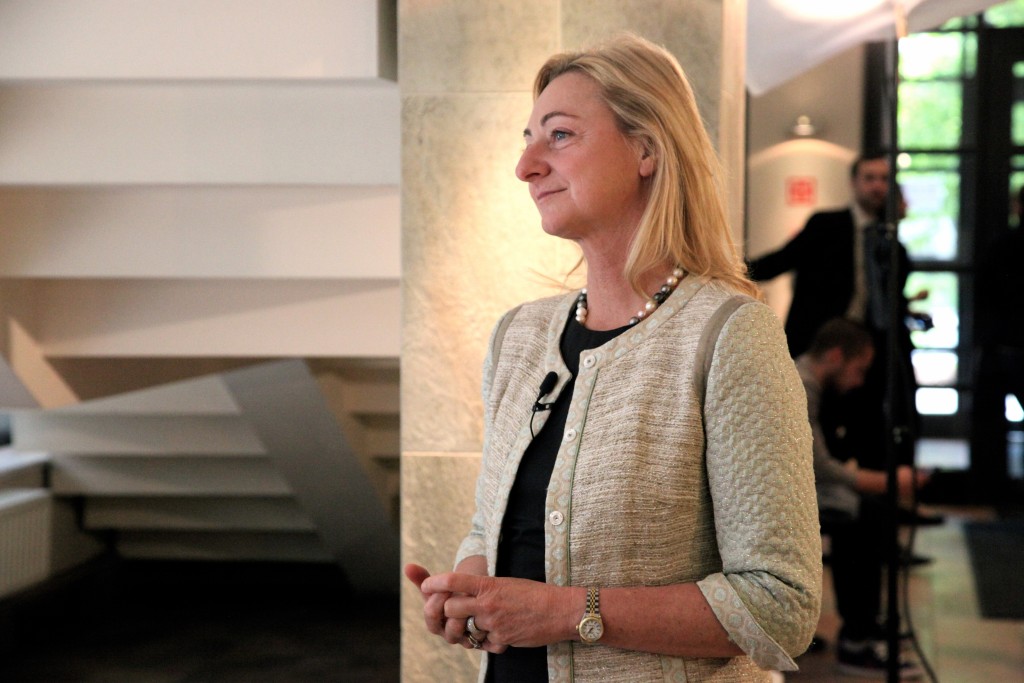During the Free Market Road Show 2015 in Warsaw, organized in cooperation with Civil Development Forum (FOR), we asked Mrs. Barbara Kolm, Director of the Austrian Economics Center which is responsible for organizing this extraordinary international conference tour, what all the fuss is about?
What is the Free Market Road Show?
It is a tour – this year through 30 countries and 35 cities – where we bring around, discuss and dispute with our audiences the questions how to create growth and how to foster entrepreneurship. The Road Show started eight years ago with just four cities and a bit more than a hundred people in the audience and a handful of speakers. And now, as it’s the eight year, we have also grown tremendously and we’re looking forward to embrace new groups. There are more than ninety partner groups with whom we organized this year’s tour. Local hosts are the key to success, because if they are unable to secure a nice location or to bring good audience then it doesn’t help if we bring the best speakers. So what we do in libertarianism is that we do not only preach the division of labour, we actually do it (laughs). And we embrace competition because there are cities which do better, some cities that are not performing as well, so we also measure that to see how things go.
So which cities were the most interesting this year? I’m trying to avoid saying the best.
They are all different from a different perspective. Some were great because we had a large number of people in the audience, some were great because we had the best questions from the audience, some were extremely successful because we had so many media reports and many TV stations that interviewed our speakers. And some were successful because we had the most local partners and entrepreneurs who supported local groups – because this is also very important. We believe in free market and we don’t rely on state subsidies so it’s highly important that our message is also related to entrepreneurs and businesses that help us kick this thing off.
Any interesting stories from the road?
Oh, yes! There are a couple. Being stuck on the airport, having flat tyres, rooms that were not ready or were kind of inhabitable, lost computers (which luckily turned up eventually). The latter can cause a real trauma, especially for our intellectuals (smiles).
But there are also funny things. After the conference we usually have dinner with our local friends, and we party and have drinks and the next day some people are really in a bad shape, have red eyes, as we usually take the red-eye flights to the next city. And this was also a mistake when we got stranded in Barcelona – four of our speakers, including me, were supposed to travel from Sevilla via Barcelona to Stockholm and we didn’t make it. We were actually hijacked for 3,5 hours on the plane, sitting in the middle of nowhere because the plane couldn’t land in Barcelona due to bad weather. So we were sitting the for 3,5 hours, and here goes our plane to Stockholm! Luckily, we had two other people (from the United States) on the ground so everything went well. Then we said, ‘let’s go to Copenhagen directly’ – because this was our next stop, but due to the bad weather a couple of flights were cancelled and delayed and we ended up at 11 o’clock at the airport before we took a hotel and then the next flight the next morning to finally go to Copenhagen. But you know, these are the things that are not pleasant but happen on a daily basis and we just have to deal with that. Visiting 35 cities in less than seven weeks can be tough.
And how do you pick the topics and the speakers?
We pick the topics due to the current relevance. Then we look who from our big pool of great international speakers fits best. This is all a great logistic undertaking: how do we bring in people who fit best or local speakers who are great intellectuals, entrepreneurs or politicians? Not everyone can be on the same panel with another speakers. So this is a huge challenge for my team back home in Vienna. They literally work a whole year with our partners. We have briefing meetings and debriefing meetings with all the local organizers. Last year, for example, we had the first test – we brought the Road Show to the US and it went extremely well thanks to the assistance with our partner: Texas Tech University. So it’s an evolving project, it’s a challenging project. But we consider ourselves not only intellectual entrepreneurs but also real entrepreneurs, because otherwise all of this would not be possible.
So what Free Market Road Show hopes to achieve in the future? What is the best case scenario?
Well, the best case scenario is that in the future each and every student and each and every entrepreneur when hearing ‘Free Market Road Show’ will say ‘Oh, this is the Austrian School of Economics! Those are the people who are reasonable, who believe in reforms, in individual responsibility, in the achievement principle and competition!’. This is the message that we want to bring. We would also like to show that there are always alternatives to what current political elites tell us. That’s the goal.



